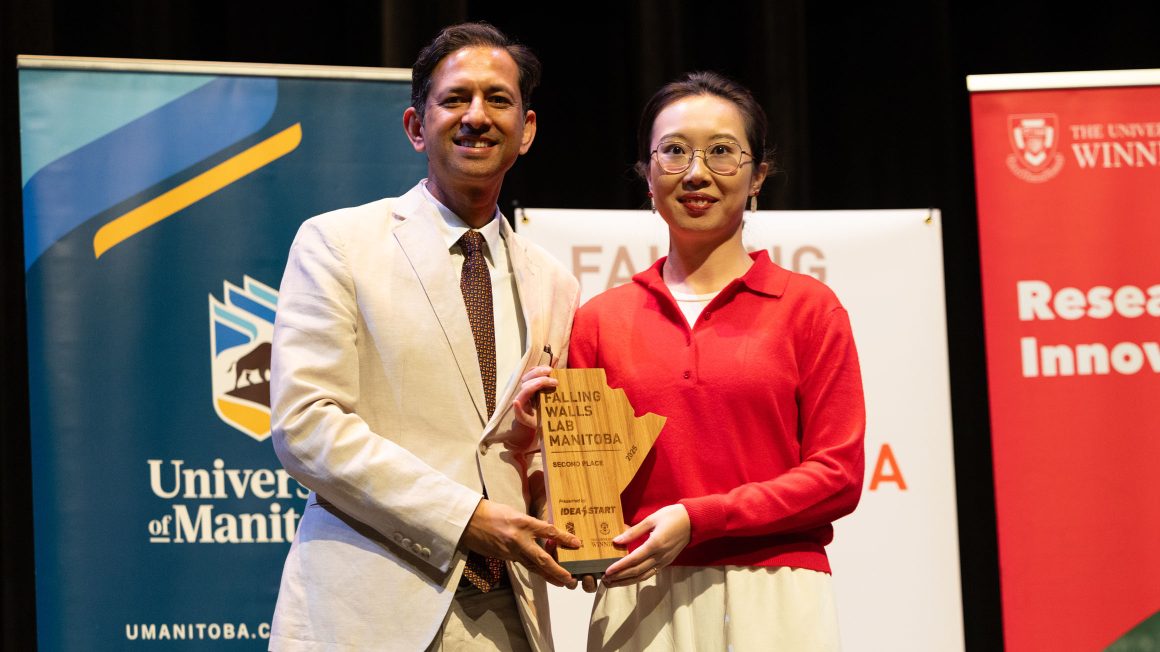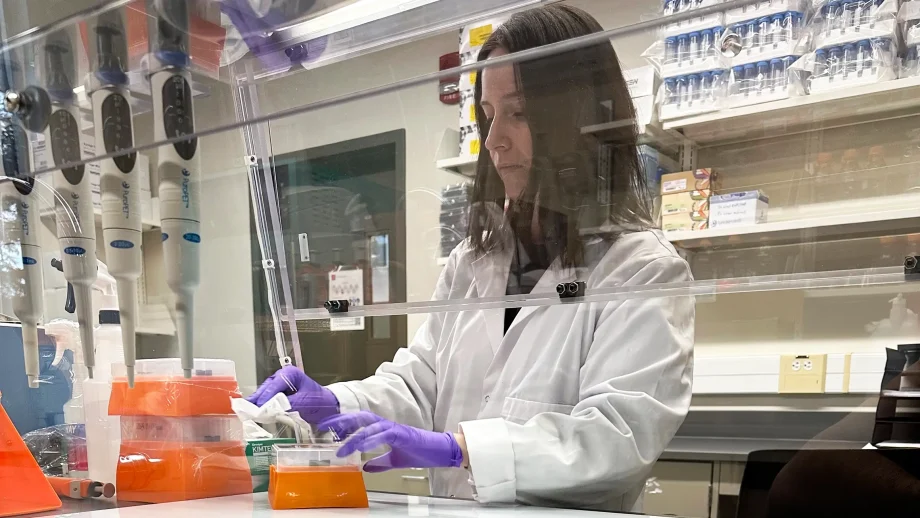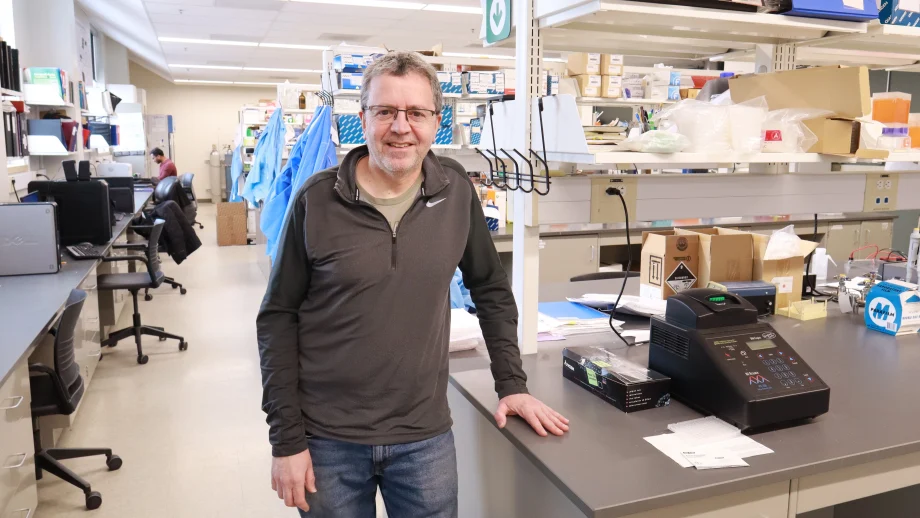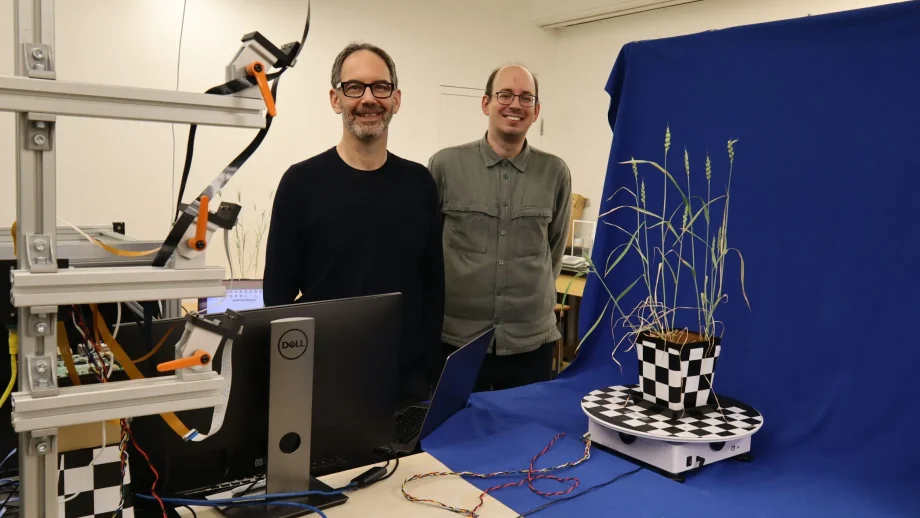The University of Winnipeg and UManitoba co-organized Falling Walls Lab Manitoba, a fast-paced global competition where students pitch their groundbreaking research, in just three minutes, to a panel of academic and industry experts.
UWinnipeg undergraduate students Anitoh Atangabua, Priyanshu Mittal and Master of Science student Faith Akinyemi, all in Applied Computer Science, represented UWinnipeg with Yujie Ren, a recent Master of Science in Bioscience, Technology, and Public Policy graduate last week at the finals.
Participating in activities such as the Falling Walls competition is valuable for students to develop skills in effectively communicating their research to diverse audiences while maintaining the core objectives of their work.
Dylan Jones
Ren earned second place and $750 in this exciting competition that promotes knowledge mobilization.
“This competition has been an invaluable experience for me,” expressed Ren after her win. “From preparation to delivery, the whole journey was like a problem-solving process, just as valuable as the result itself. I truly enjoyed it!”
Yen and her fellow UWinnipeg participants presented their three-minute pitch to a jam-packed auditorium competing with seven other colleagues from across the province.
“Participating in activities such as the Falling Walls competition is valuable for students to develop skills in effectively communicating their research to diverse audiences while maintaining the core objectives of their work,” shared Dylan Jones, Program Officer, Research Awards, Chairs, and Special Initiatives, Office of the Vice-President, Research and Innovation, and initial Falling Walls reviewer. “Such experiences will support students’ professional development as they pursue future careers in academia, industry, and other sectors.”
The participants
Akinyemi is using machine learning to help farmers reduce uncertainty at harvest with her advisors Dr. Michael Beck (Applied Computer Science) and Dr. Christopher Bidinosti (Physics).
Akinyemi competed in the Falling Walls Lab because she believes science should be shared.
“This competition gave me the opportunity to share my research with a broader audience, build collaborations, and inspire confidence that AI can empower agriculture.
Mittal is using artificial intelligence (AI) to improve early identification of Human Metapneumovirus (HMPV), a potentially serious respiratory virus that affects children and the elderly.
“HMPV is often diagnosed late, after it has already infected communities and flooded hospitals, shared Mittal. “Faster prediction would give healthcare professionals more time to respond, reduce unnecessary burden on hospitals, and make a difference for at-risk patients.”
With Falling Walls, Mittal wants to convey how new ideas in computer science can be applied in solving urgent health problems.
“The platform will allow me to make others more aware of HMPV as well as show how AI can be applied beyond traditional areas in aiding global health,” said Mittal.
Second prize winner Ren, worked with UWinnipeg physicist Dr. Melanie Martin, on improving magnetic resonance imaging (MRI), with a particular emphasis on intraoperative MRI and wireless RF coil technologies.
Ren notes that the design of compact, flexible, intraoperative coils can significantly enhance the precision of real-time surgical guidance, thereby improving people’s outcomes.
Like Akinyemi and Mittal, Ren wants to share the research with a broader audience and contribute to change in a meaningful way.
“It also gave me an opportunity to engage with others, receive valuable feedback, and continue building the skills to communicate complex scientific and policy issues clearly,” said Ren.
The winner, Luma Lopes Clarindo, from UManitoba, whose research was on Breaking the Walls of Antibiotic Resistance, received $1,000 plus a trip to Berlin and the honour to represent Manitoba at the final international Falling Walls Science Summit in early November competing with 100 other finalists from around the world.
The project is powered by a strong network of partners from academia, science, and diplomacy. A key supporter is the German Academic Exchange Service (DAAD), which funds 30 of the 81 international Labs. Additional partners include the Federal Ministry of Education, Research and Innovation, Technology and Space, the Berlin Senate, the Museum für Naturkunde Berlin, and leading universities and research institutions worldwide.





